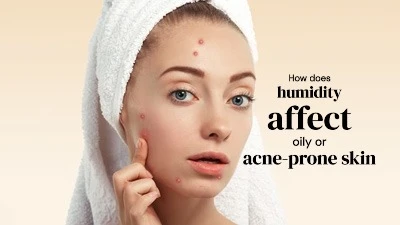How does humidity affect oily or acne-prone skin
How Does Humidity Affect Oily or Acne-Prone Skin?
Humidity plays a significant role in skin health, and its effects are especially noticeable in individuals with oily or acne-prone skin. High moisture levels in the air can trigger changes in how your skin behaves, which can either help or worsen acne depending on how your skincare is managed. Understanding the impact of humidity allows for better control of breakouts and excessive oiliness.
1. Increased Sebum Production
In humid weather, the skin tends to produce more sebum (natural oil). This is the body’s way of balancing hydration and protecting the skin barrier. However, for those with already oily skin, this can lead to an excess buildup of oil on the skin's surface. When sebum mixes with sweat, dirt, and dead skin cells, it can clog pores and lead to blackheads, whiteheads, and inflammatory acne.
2. Enlarged and Clogged Pores
High humidity often results in sweating, which opens up the pores. While sweating can help expel toxins, it also increases the risk of pore blockage, especially when combined with oil and pollution. If the sweat isn’t cleansed properly, bacteria can thrive, worsening breakouts and leading to more frequent acne flare-ups.
3. Sticky, Greasy Feel
Oily or acne-prone skin can feel heavier and stickier during humid conditions. Makeup and sunscreen may slide off more easily, leading to clogged pores or irritation from reapplication. This creates an environment where bacteria can flourish, contributing further to acne problems.
4. Benefits of Humidity for Skin Hydration
Interestingly, a moderate level of humidity can be beneficial by helping skin retain moisture. Well-hydrated skin maintains a strong barrier, which is essential in preventing irritation and inflammation. In fact, dryness can sometimes lead to overproduction of oil as the skin tries to compensate, so a bit of humidity may help reduce this overreaction.
5. Choosing the Right Skincare in Humid Weather
To manage the effects of humidity:
-
Use a lightweight, non-comedogenic moisturizer to maintain hydration without clogging pores.
-
Opt for gel-based or foaming cleansers that remove excess oil effectively but gently.
-
Incorporate salicylic acid or niacinamide to control oil production and soothe inflammation.
-
Avoid heavy creams or oils, which can feel suffocating and increase the risk of clogged pores.
-
Exfoliate 1–2 times a week with a chemical exfoliant like BHA to prevent buildup.
-
Always remove makeup and sunscreen thoroughly at the end of the day.
6. Hygiene and Habits
Keeping your skin clean during humid days is crucial. Wash your face twice a day and avoid touching it frequently, as bacteria from hands can worsen acne. Use blotting papers or oil-control powders to manage shine during the day without disrupting your skin barrier.
Conclusion
Humidity can significantly influence oily and acne-prone skin, often tipping the balance toward more oil production and increased risk of breakouts. However, with the right skincare routine—focused on gentle cleansing, lightweight hydration, and proper pore care—you can maintain healthy, balanced skin even in the most humid conditions.

Related Blog
What Causes Oily Skin and Can It Be Managed Naturally? Exploring Root Causes and Gentle Solutions
Aug 2, 2025 by Admin
General
What Are the Signs That You Have Sensitive Skin? Key Symptoms to Help You Identify This Delicate Skin Type
Aug 1, 2025 by Admin
General